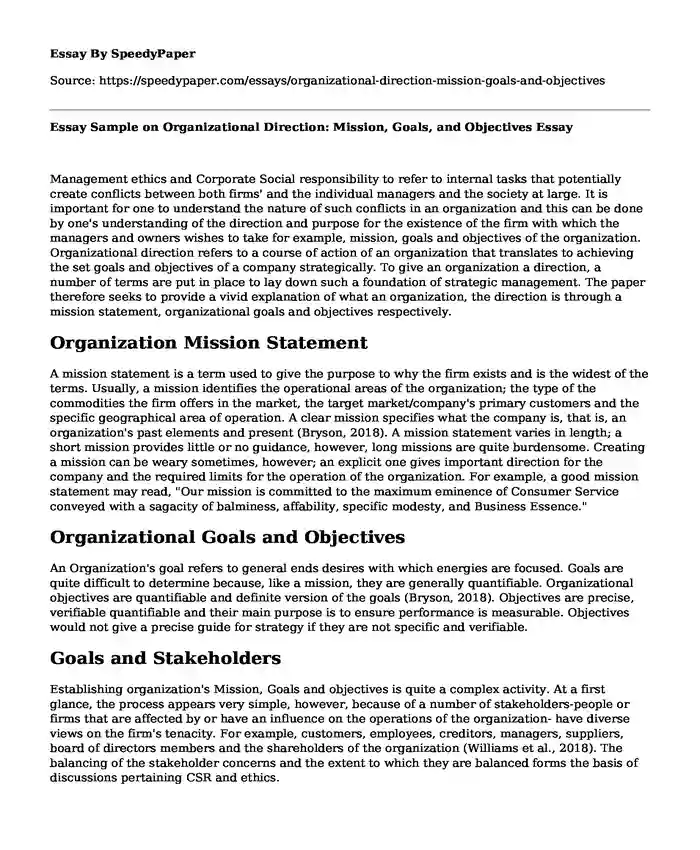
| Type of paper: | Essay |
| Categories: | Company Strategic management |
| Pages: | 3 |
| Wordcount: | 645 words |
Management ethics and Corporate Social responsibility to refer to internal tasks that potentially create conflicts between both firms' and the individual managers and the society at large. It is important for one to understand the nature of such conflicts in an organization and this can be done by one's understanding of the direction and purpose for the existence of the firm with which the managers and owners wishes to take for example, mission, goals and objectives of the organization. Organizational direction refers to a course of action of an organization that translates to achieving the set goals and objectives of a company strategically. To give an organization a direction, a number of terms are put in place to lay down such a foundation of strategic management. The paper therefore seeks to provide a vivid explanation of what an organization, the direction is through a mission statement, organizational goals and objectives respectively.
Organization Mission Statement
A mission statement is a term used to give the purpose to why the firm exists and is the widest of the terms. Usually, a mission identifies the operational areas of the organization; the type of the commodities the firm offers in the market, the target market/company's primary customers and the specific geographical area of operation. A clear mission specifies what the company is, that is, an organization's past elements and present (Bryson, 2018). A mission statement varies in length; a short mission provides little or no guidance, however, long missions are quite burdensome. Creating a mission can be weary sometimes, however; an explicit one gives important direction for the company and the required limits for the operation of the organization. For example, a good mission statement may read, "Our mission is committed to the maximum eminence of Consumer Service conveyed with a sagacity of balminess, affability, specific modesty, and Business Essence."
Organizational Goals and Objectives
An Organization's goal refers to general ends desires with which energies are focused. Goals are quite difficult to determine because, like a mission, they are generally quantifiable. Organizational objectives are quantifiable and definite version of the goals (Bryson, 2018). Objectives are precise, verifiable quantifiable and their main purpose is to ensure performance is measurable. Objectives would not give a precise guide for strategy if they are not specific and verifiable.
Goals and Stakeholders
Establishing organization's Mission, Goals and objectives is quite a complex activity. At a first glance, the process appears very simple, however, because of a number of stakeholders-people or firms that are affected by or have an influence on the operations of the organization- have diverse views on the firm's tenacity. For example, customers, employees, creditors, managers, suppliers, board of directors members and the shareholders of the organization (Williams et al., 2018). The balancing of the stakeholder concerns and the extent to which they are balanced forms the basis of discussions pertaining CSR and ethics.
Shareholders are the stakeholders that dominate the larger group whose goal is maximization of incomes whereas the creditors' goal is long-term survival of the firm for their loans to be fully paid. On the other hand, the customers' interest is the lowest possible prices that when offered would lead to losses, whereas management objectives, concerns all other stakeholders whose main concern are to maintain a healthy organization in the long run (Williams et al., 2018). The managers face the toughest task ensuring there is the reconciliation of the existing conflicts while in pursuant of their set goals that include advancement of careers and the quality of the work life.
References
Bryson, J. M. (2018). Strategic planning for public and nonprofit organizations: A guide to strengthening and sustaining organizational achievement. John Wiley & Sons.
Williams Jr, R. I., Pieper, T. M., Kellermanns, F. W., & Astrachan, J. H. (2018). Family firm goals and their effects on strategy, family and organization behavior: A review and research agenda. International Journal of Management Reviews, 20, S63-S82.
Cite this page
Essay Sample on Organizational Direction: Mission, Goals, and Objectives. (2022, Oct 24). Retrieved from https://speedypaper.net/essays/organizational-direction-mission-goals-and-objectives
Request Removal
If you are the original author of this essay and no longer wish to have it published on the SpeedyPaper website, please click below to request its removal:
- Free Essay on Risk of Recidivism of Sexual Assault
- Presidential Veto, Free Essay Sample
- Organizational Learning in OKI - Research Paper Example
- Historical Essay Example on the Cuban Missile Crisis
- Essay Example on the Amniotic Fluid Embolism Event
- Plato's Theory of Form, Free Essay in Philosophy
- Essay Example on Muslim Brotherhood Organization
Popular categories




